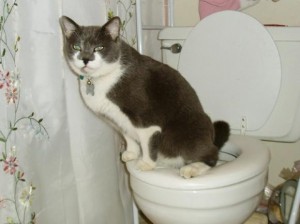Prevent Plumbing Problems: Don't Flush Cat Poop Down Your Toilet - Professional Advice
Prevent Plumbing Problems: Don't Flush Cat Poop Down Your Toilet - Professional Advice
Blog Article
Have you been on the lookout for facts and techniques concerning Don’t flush cat feces down the toilet?

Introduction
As pet cat owners, it's important to be mindful of how we dispose of our feline pals' waste. While it might seem practical to flush cat poop down the bathroom, this practice can have damaging effects for both the setting and human health and wellness.
Ecological Impact
Flushing pet cat poop introduces dangerous microorganisms and bloodsuckers into the water supply, presenting a significant danger to aquatic environments. These impurities can negatively influence aquatic life and compromise water high quality.
Wellness Risks
In addition to environmental problems, purging feline waste can likewise pose health risks to human beings. Cat feces might contain Toxoplasma gondii, a bloodsucker that can cause toxoplasmosis-- a potentially extreme health problem, particularly for expectant women and individuals with weakened immune systems.
Alternatives to Flushing
Luckily, there are much safer and a lot more responsible methods to dispose of pet cat poop. Consider the following options:
1. Scoop and Dispose in Trash
The most typical method of dealing with cat poop is to scoop it right into a naturally degradable bag and toss it in the trash. Make certain to use a devoted litter inside story and throw away the waste quickly.
2. Use Biodegradable Litter
Select naturally degradable feline clutter made from materials such as corn or wheat. These trashes are eco-friendly and can be securely dealt with in the garbage.
3. Bury in the Yard
If you have a lawn, consider hiding feline waste in an assigned location away from vegetable yards and water resources. Make certain to dig deep adequate to avoid contamination of groundwater.
4. Mount a Pet Waste Disposal System
Buy a pet dog garbage disposal system particularly made for pet cat waste. These systems use enzymes to break down the waste, minimizing smell and ecological influence.
Verdict
Liable pet possession expands past supplying food and shelter-- it likewise entails proper waste administration. By avoiding flushing feline poop down the bathroom and choosing alternate disposal techniques, we can lessen our environmental impact and protect human health and wellness.
Why You Should Never Flush Cat Poop Down the Toilet
A rose by any other name might smell as sweet, but not all poop is created equal. Toilets, and our sewage systems, are designed for human excrement, not animal waste. It might seem like it couldn’t hurt to toss cat feces into the loo, but it’s not a good idea to flush cat poop in the toilet.
First and foremost, assuming your cat uses a litter box, any waste is going to have litter on it. And even the smallest amount of litter can wreak havoc on plumbing.
Over time, small amounts build up, filling up your septic system. Most litter sold today is clumping; it is made from a type of clay that hardens when it gets wet. Ever tried to scrape old clumps from the bottom of a litter box? You know just how cement-hard it can get!
Now imagine just a small clump of that stuck in your pipes. A simple de-clogger like Drano isn’t going to cut it. And that means it’s going to cost you big time to fix it.
Parasitic Contamination
Believe it or not, your healthy kitty may be harboring a nasty parasite. Only cats excrete Toxoplasma in their feces. Yet it rarely causes serious health issues in the cats that are infected. Most people will be fine too if infected. Only pregnant women and people with compromised immune systems are at risk. (If you’ve ever heard how women who are expecting are excused from litter cleaning duty, Toxoplasma is why.)
But other animals may have a problem if infected with the parasite. And human water treatment systems aren’t designed to handle it. As a result, the systems don’t remove the parasite before discharging wastewater into local waterways. Fish, shellfish, and other marine life — otters in particular — are susceptible to toxoplasma. If exposed, most will end up with brain damage and many will die.
Depending on the species of fish, they may end up on someone’s fish hook and, ultimately on someone’s dinner plate. If that someone has a chronic illness, they’re at risk.
Skip the Toilet Training
We know there are folks out there who like to toilet train their cats. And we give them props, it takes a lot of work. But thanks to the toxoplasma, it’s not a good idea.

We were introduced to that article about How to Dispose of Cat Poop and Litter Without Plastic Bags through an acquaintance on a different website. Enjoyed our post? Please share it. Let someone else locate it. Thank you for taking the time to read it.
Or Book Technician Here Report this page